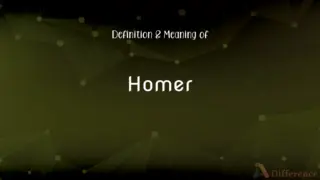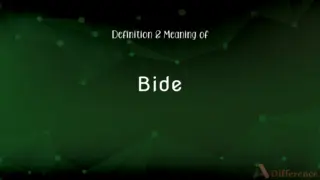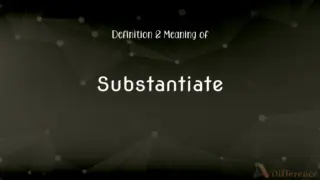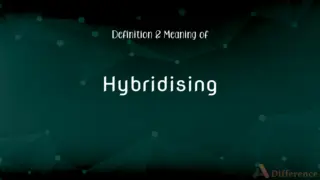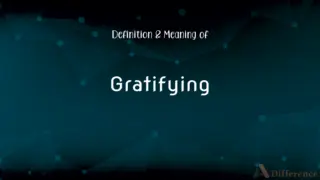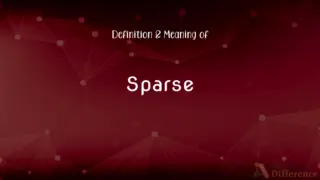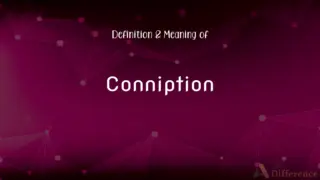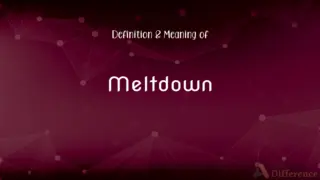Adept vs. Proficient — What's the Difference?
By Tayyaba Rehman & Maham Liaqat — Updated on April 3, 2024
Adept describes someone highly skilled or expert in a particular area, while proficient implies competency and skill through practice and learning.
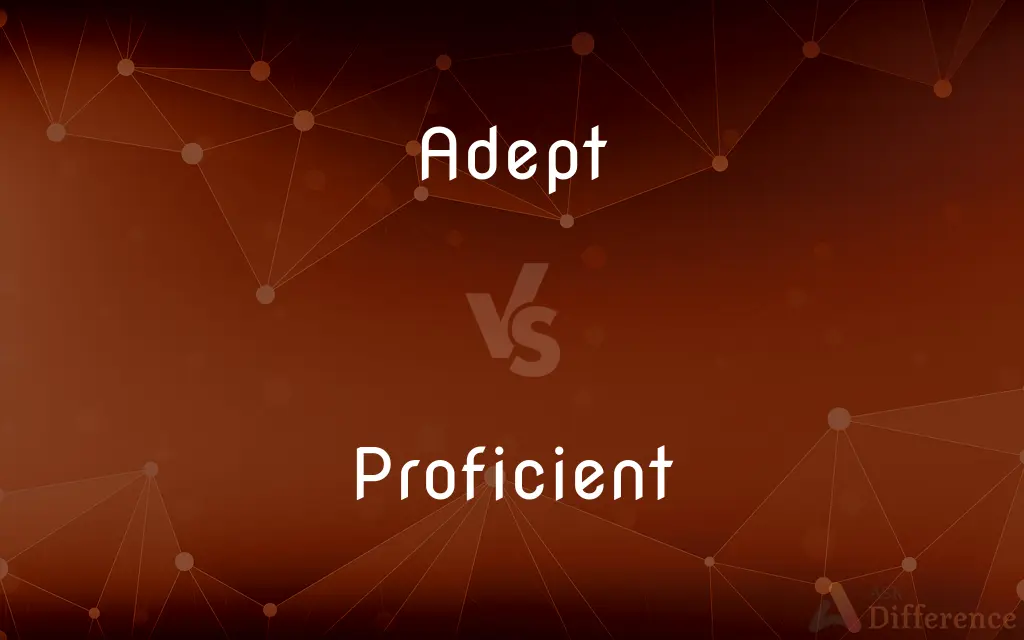
Difference Between Adept and Proficient
Table of Contents
ADVERTISEMENT
Key Differences
Adept refers to a high level of skill or expertise in a particular area, often implying natural ability combined with learning. Whereas, proficient suggests a good level of competence in a skill or area, usually as a result of diligent practice and learning.
Adept individuals are often seen as experts who can perform tasks with great finesse and ease, demonstrating mastery in their field. On the other hand, those who are proficient are capable and competent, able to perform tasks well but may not have the same level of innate ability or mastery.
Being adept often conveys a sense of intuition and natural talent in addition to skill, suggesting that the individual has a deep, innate understanding of their area. Proficient, however, emphasizes the role of learning and practice in achieving competency, suggesting a journey of improvement and development.
While adeptness is frequently associated with a narrower field of expertise, where the individual has dedicated a significant amount of time and energy, proficiency can be broader, indicating a reliable competence across a range of activities or subjects.
In some contexts, being called an adept might imply a higher esteem or recognition of one's skill level compared to being labeled proficient, which is often seen as a prerequisite or foundation level in many professional and educational settings.
ADVERTISEMENT
Comparison Chart
Definition
Possessing a high level of skill or expertise in a field
Having a good level of skill or competence in a field
Skill Level
Expert, masterful
Competent, capable
Emphasis
Innate ability plus learning
Skill through learning and practice
Context of Use
Narrower fields of expertise
Broader range of activities or subjects
Connotation
Often implies higher esteem or recognition
Seen as a prerequisite or foundational skill level
Compare with Definitions
Adept
Possessing a deep, intuitive understanding of a subject.
She's adept at reading the subtle cues in body language.
Proficient
Often seen as a foundational skill level in professional settings.
Job applicants must be proficient in basic computer skills.
Adept
Demonstrating a high level of proficiency and capability.
Adept craftsmen can create masterpieces with minimal tools.
Proficient
Capable of performing tasks or duties well.
He's proficient with a wide range of software tools.
Adept
Highly skilled or expert in a specific field.
An adept jazz pianist can improvise beautifully over complex chord changes.
Proficient
Reflecting a solid, reliable competence.
Proficient writers can convey complex ideas clearly and concisely.
Adept
Masterful performance or execution in a particular area.
His adept handling of the negotiations led to a successful deal.
Proficient
Indicates a journey of learning and improvement.
Becoming proficient on the guitar requires consistent practice.
Adept
Often implies a mix of innate talent and learned skill.
He's naturally adept at mathematics, solving complex problems with ease.
Proficient
Having a good level of skill or competence in a particular area through practice.
She's proficient in three languages, thanks to years of study and practice.
Adept
An adept is an individual identified as having attained a specific level of knowledge, skill, or aptitude in doctrines relevant to a particular author or organization. He stands out from others with his great abilities.
Proficient
Competent or skilled in doing or using something
I was proficient at my job
She felt reasonably proficient in Italian
Adept
Very skilled or accomplished.
Proficient
A person who is proficient
He became a proficient in Latin and Greek
Adept
A highly skilled person; an expert
"political consequences in getting rid of all the skeptics, unbelievers, and adepts of rival faiths" (Gene Lyons).
Proficient
Having or marked by an advanced degree of competence, as in an art, vocation, profession, or branch of learning.
Adept
Well skilled; completely versed; thoroughly proficient
Proficient
A person who exhibits such competence; an expert.
Adept
One fully skilled or well versed in anything; a proficient
Adepts in philosophy
Proficient
Good at something; skilled; fluent; practiced, especially in relation to a task or skill.
He was a proficient writer with an interest in human nature.
Adept
One fully skilled or well versed in anything; a proficient; as, adepts in philosophy.
Proficient
An expert.
Adept
Well skilled; completely versed; thoroughly proficient.
Beaus adept in everything profound.
Proficient
One who has made considerable advances in any business, art, science, or branch of learning; an expert; an adept; as, proficient in a trade; a proficient in mathematics, music, etc.
Adept
Someone who is dazzlingly skilled in any field
Proficient
Well advanced in any branch of knowledge or skill; possessed of considerable acquirements; well-skilled; versed; adept,
Adept
Having or showing knowledge and skill and aptitude;
Adept in handicrafts
An adept juggler
An expert job
A good mechanic
A practiced marksman
A proficient engineer
A lesser-known but no less skillful composer
The effect was achieved by skillful retouching
Proficient
Having or showing knowledge and skill and aptitude;
Adept in handicrafts
An adept juggler
An expert job
A good mechanic
A practiced marksman
A proficient engineer
A lesser-known but no less skillful composer
The effect was achieved by skillful retouching
Common Curiosities
Can proficiency lead to adeptness?
Yes, with enough practice, learning, and experience, someone proficient can become adept in their field.
Is being adept better than being proficient?
Being adept often implies a higher level of skill and mastery than being proficient, though both are positive attributes.
Is proficiency sufficient for professional success?
Proficiency is often a foundational level of skill necessary for professional success, though higher levels of expertise can lead to greater achievements.
What are the signs of being proficient in a skill?
Signs include the ability to perform tasks competently, efficiently, and reliably, often without need for reference or assistance.
How does someone become proficient at a skill?
Proficiency is achieved through diligent practice, learning, and applying knowledge over time.
Does being adept always involve innate talent?
While innate talent can contribute, adeptness also involves significant learning and practice.
What does it mean to be adept in a field?
Being adept means having a high level of skill or expertise in a specific area, often combining innate talent with learned knowledge.
Do adept individuals need to practice to maintain their skills?
Yes, adept individuals often continue practicing to maintain and enhance their high level of skill.
Can technological advancements help in becoming proficient faster?
Yes, technology can provide resources, tools, and platforms that accelerate the learning process towards achieving proficiency.
Can someone be adept in multiple fields?
While rare, it's possible for individuals to be adept in multiple fields, especially if they have dedicated significant time and effort to each.
Do adept individuals continue learning in their field?
Yes, to maintain their high level of skill and stay updated with advancements, adept individuals often engage in continuous learning.
How important is mindset in becoming adept or proficient?
A growth mindset, embracing challenges, continuous learning, and resilience, is crucial for achieving both proficiency and adeptness in any field.
How do employers measure proficiency?
Employers may use tests, certifications, or performance assessments to measure proficiency in specific skills.
Can proficiency be measured across different fields equally?
While proficiency levels can be assessed in any field, the criteria and standards may vary significantly across different disciplines.
Is there a fixed time frame to achieve proficiency or adeptness?
The time it takes to achieve proficiency or adeptness varies widely based on the skill, individual learning pace, and dedication.
Share Your Discovery

Previous Comparison
Squire vs. Knight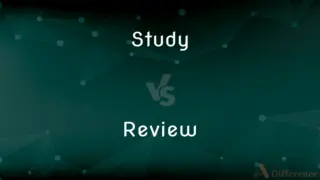
Next Comparison
Study vs. ReviewAuthor Spotlight
Written by
Tayyaba RehmanTayyaba Rehman is a distinguished writer, currently serving as a primary contributor to askdifference.com. As a researcher in semantics and etymology, Tayyaba's passion for the complexity of languages and their distinctions has found a perfect home on the platform. Tayyaba delves into the intricacies of language, distinguishing between commonly confused words and phrases, thereby providing clarity for readers worldwide.
Co-written by
Maham Liaqat



































